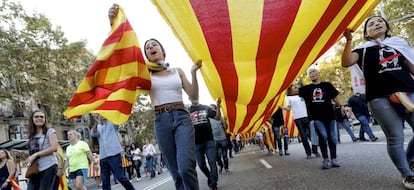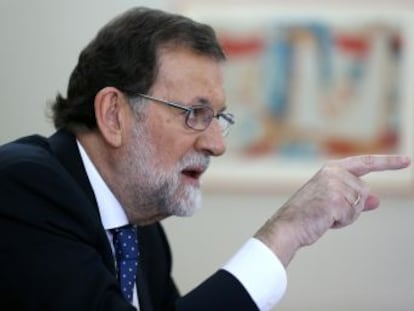Catalan universities reject a unilateral declaration of independence
All the schools in the region are calling for dialogue, but not all hold the same position on the ¡°process¡±

Catalan universities have joined the call for ¡°mediation, dialogue and conciliation¡± by the Bar Association of Barcelona, an entity that seeks a return to normality after the illegal referendum on October 1 in Catalonia. All are asking for dialogue between political agents, but not all hold the same position on the process. On Friday, the University of Girona approved a manifesto of support for the regional government.

The seven public, three private and one mixed-model schools have all been implicated in last month¡¯s events, including the student strikes called ¡°against repression and for the right to decide,¡± the voting, the police intervention on October 1, and the general strike in the region two days later.
The organizations that have signed up to the Bar Association¡¯s initiative range from the University of Lleida, whose management team was pushed by the faculty staff to support the right to hold a referendum, to the University of Girona, which on Friday approved a manifesto supporting the regional government ¡°in the self-determination process¡± and whose faculty called for the ¡°disassociation from organizations in which the Spanish monarchy participates,¡± after King Felipe VI¡¯s televised speech on October 3.
The regional government has not clarified whether there will be a unilateral declaration of independence in the coming days. Prime Minister Mariano Rajoy maintains that, before sitting down to speak, the Catalan regional premier must return to legality. So what kind of dialogue are the universities calling for?
This country has gone through much more complicated situations Joan Elias, the president of the University of Barcelona
¡°Maybe they need to stop and talk. I will not say what they have to do, but when you negotiate, you have to give something up,¡± said Joan Elias, the dean of the University of Barcelona (UB), the largest college in Catalonia with 63,000 students. ¡°This country has gone through much more complicated situations, such as the [attempted coup] on February 23, 1981, or the Transition [to democracy], where there was a table where they sat down to speak [...],¡± says Elias.
The rest of universities adhered to the initiative after a meeting held last Thursday at UB. The text they have signed does not explicitly state the rejection of the unilateral declaration of independence. ¡°Universities are a reflection of Catalan society, and the latter is not in favor of the unilateral declaration,¡± says the president of UB. The University of Girona has nevertheless aligned itself with the regional government while demanding dialogue and mediation.
UB¡¯s central courtyard is closed to the public these days to preserve the works and paintings it houses made by students during their sit-in protests in support of the referendum, demonstrations that were reproduced to a greater or lesser extent on other Catalan campuses. Some universities remained open during the strikes but asked their teachers to avoid scheduling exams for that day. The dean of the Pompeu Fabra University, Jaume Casals, announced that the school would close for the day due to the ¡°exceptional situation that Catalonia is going through.¡±
The group of universities also backed the ¡°national strike and rejected police intervention during voting, the episodes of violence, and the unjustifiable actions in Catalonia exercised on October 1 by the Civil Guard and the National Police,¡± according to the Polytechnic University of Catalonia¡¯s statement.
English version by Debora Almeida.
Tu suscripci¨®n se est¨¢ usando en otro dispositivo
?Quieres a?adir otro usuario a tu suscripci¨®n?
Si contin¨²as leyendo en este dispositivo, no se podr¨¢ leer en el otro.
FlechaTu suscripci¨®n se est¨¢ usando en otro dispositivo y solo puedes acceder a EL PA?S desde un dispositivo a la vez.
Si quieres compartir tu cuenta, cambia tu suscripci¨®n a la modalidad Premium, as¨ª podr¨¢s a?adir otro usuario. Cada uno acceder¨¢ con su propia cuenta de email, lo que os permitir¨¢ personalizar vuestra experiencia en EL PA?S.
?Tienes una suscripci¨®n de empresa? Accede aqu¨ª para contratar m¨¢s cuentas.
En el caso de no saber qui¨¦n est¨¢ usando tu cuenta, te recomendamos cambiar tu contrase?a aqu¨ª.
Si decides continuar compartiendo tu cuenta, este mensaje se mostrar¨¢ en tu dispositivo y en el de la otra persona que est¨¢ usando tu cuenta de forma indefinida, afectando a tu experiencia de lectura. Puedes consultar aqu¨ª los t¨¦rminos y condiciones de la suscripci¨®n digital.










































